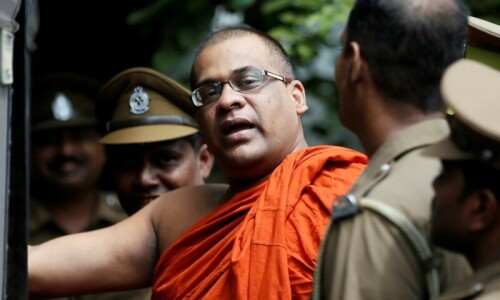• Experts suggest prevailing on Hibatullah Akhundzada to solve outstanding issues with Afghanistan
• Call for holistic approach to counterterrorism
• PIPS head opposes idea of restarting dialogue with banned group, says it would lend them political legitimacy
ISLAMABAD: Pakistan should engage with the Afghan Taliban leadership in Kandahar — the actual seat of power in Afghanistan — as it can help address Islamabad’s concerns about the banned Tehreek-i-Taliban Pakistan’s (TTP) hideouts, experts suggested on Wednesday.
The consensus among the group of experts, hailing from the media, academic and security institutions, seemed to be that Islamabad needs to directly talk to Taliban supreme leader Hibatullah Akhundzada to resolve its issues, particularly those of cross-border terrorism and trade, as he has influence over all ranks of the interim regime in Kabul.
The discussion took place at a dialogue titled ‘The Militant Landscape in Pakistan 2024-25’, organised by Islamabad-based think-tank Pak Institute for Peace Studies (PIPS) as part of a perception study that seeks to analyse the evolving militant landscape in the country.
Israr Madani, president of the International Research Council for Religious Affairs, said all major decisions by the Afghan regime, including the ban on women’s education, were taken in Kandahar.
“Islamabad must talk to the Afghan Taliban leadership sitting in Kandahar,” he said, adding that Pakistan should facilitate them if they need some health and visa facilities. “Ultimately, this channel would help Pakistan resolve all its issues with the neighbouring country,” he added.
Pakistan Institute for Conflict and Security Studies (PICSS) Managing Director Abdullah Khan observed that the proscribed TTP and other militant groups had changed their operational strategies by reducing attacks on civilians merely to rebuild their public perception.
Tahir Khan, a journalist with a keen interest in Afghan affairs, questioned that if Russia, China and Central Asian states could evolve a strategy to engage with the Afghan Taliban, then why was Pakistan pursuing a policy of disengagement.
Aarish U. Khan, research analyst at the Institute of Regional Studies, claimed that the state’s counterterrorism policy was not holistic. There is a need to involve local communities besides focusing on kinetic operations, he added.
Journalist Azaz Syed said that final decision-making to resolve the conflict should be done by parliament and civilian authorities, recalling how a civilian government had decided to initiate the Swat operation to curb militancy, which had brought long-lasting peace to the area.
Centre for Research and Security Studies (CRSS) Executive Director Imtiaz Gul was of the view that Pakistan had an ad hoc policy when it came to dealing with terrorism and militancy. “We are not extinguishing [the] fire but doing spot-fixing,” he said, adding that Pakistan’s Afghanistan policy should be led by civilians.
In his concluding remarks, PIPS President Muhammad Amir Rana opposed the idea of restarting talks with the outlawed TTP, saying that dialogue gave political and moral legitimacy to militancy and provided fuel to it.
“TTP is an existential threat for Pakistan and there should be zero tolerance for the group,” he added.
Published in Dawn, January 9th, 2025














































Dear visitor, the comments section is undergoing an overhaul and will return soon.